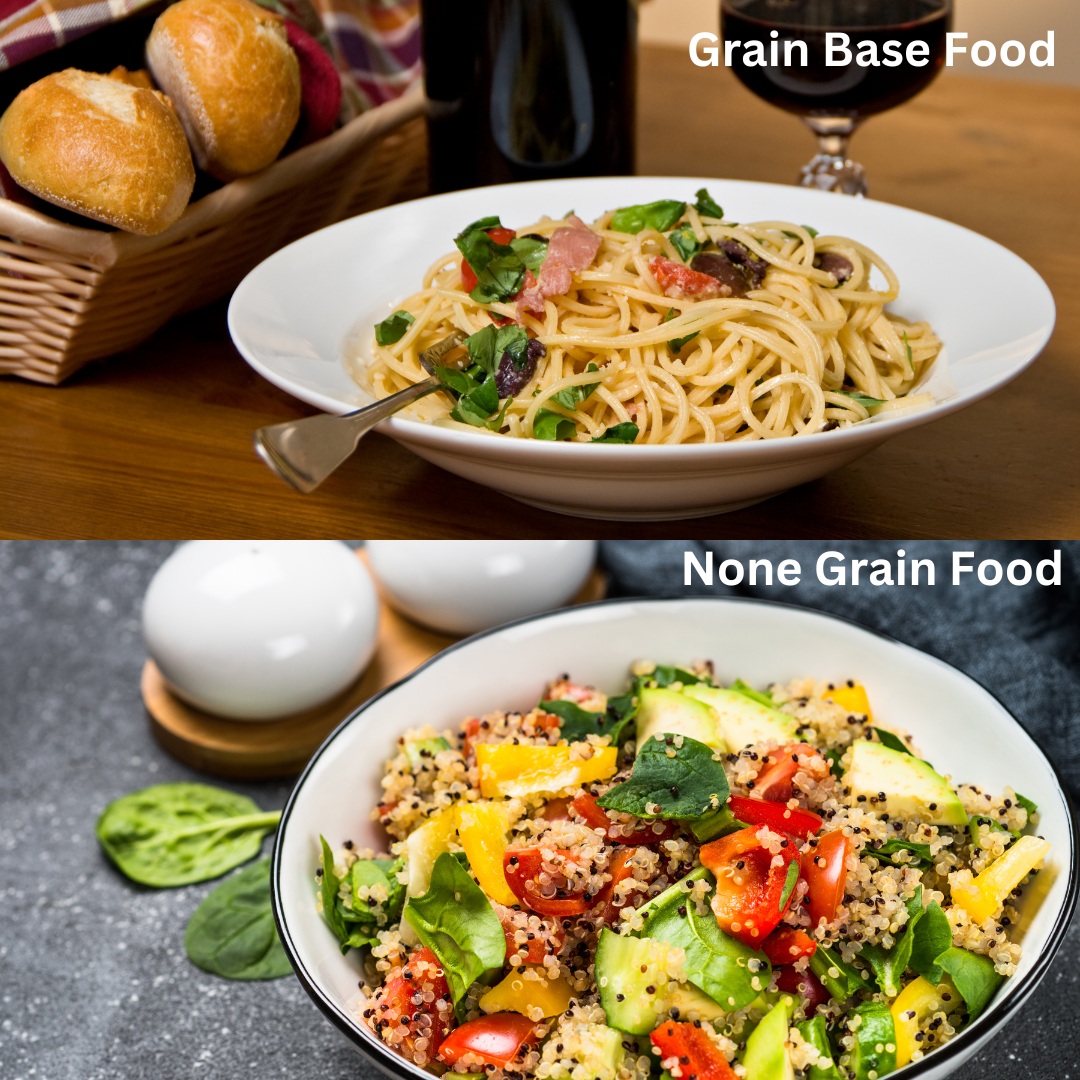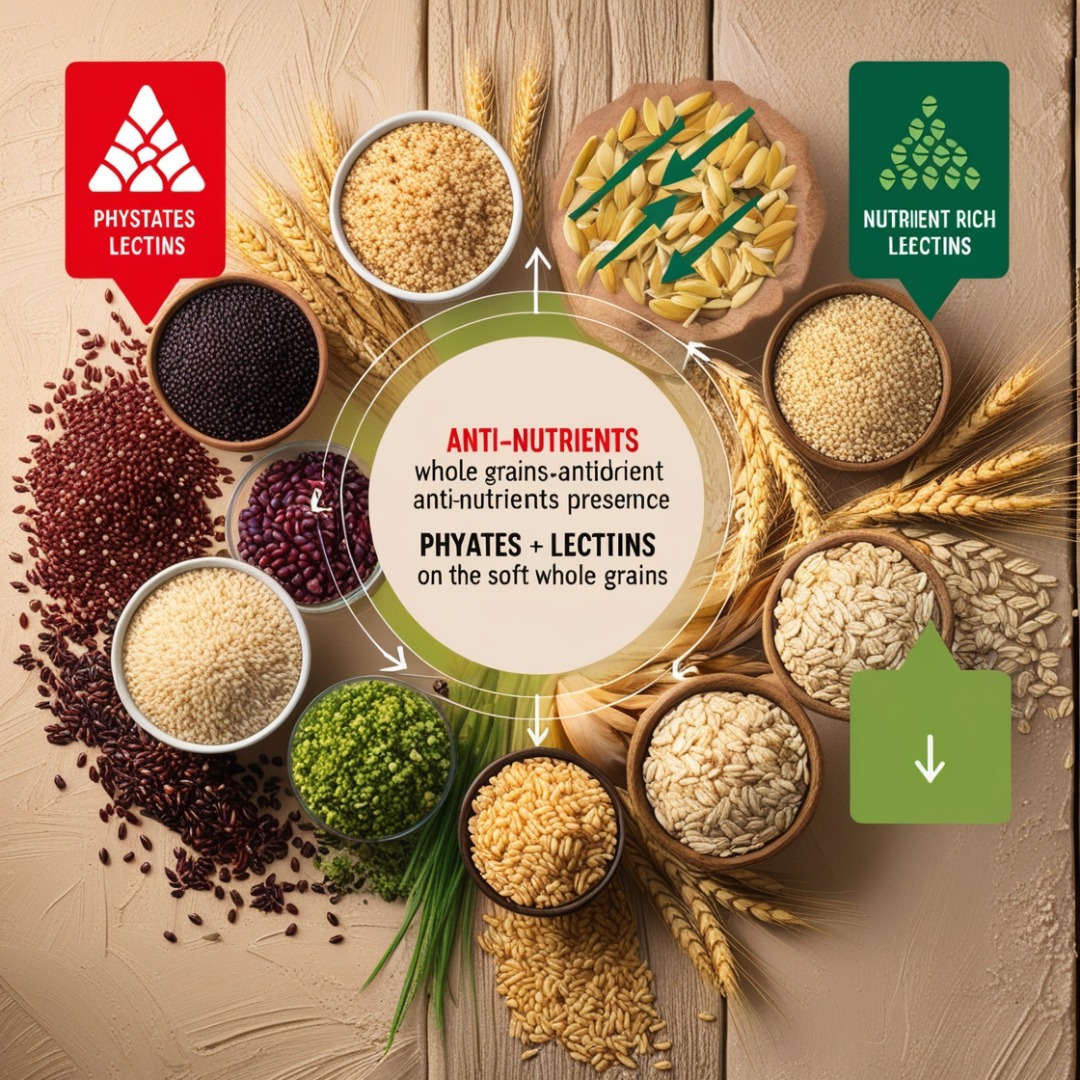Disclosure:
Thank you for reading this post, don't forget to subscribe!
Some of the links on this website are affiliate links. This means that if you click on the link and make a purchase, we may receive a small commission at no extra cost to you. Your support helps us keep the site running.Learn more on my Privacy Policy and Affiliate Disclosure page. Thank you for your support!

Grains have long been hailed as a dietary staple, forming the backbone of many traditional diets around the world. However, recent research and dietary trends have sparked a debate around the health implications of grain consumption. The question of whether grains are truly essential or potentially harmful has led to a paradigm shift in how we perceive this once revered food group.
In this article, we will delve deep into the controversial topic of grains, exploring their historical significance, nutritional profile, and potential health risks. From ancient civilizations to modern dietary patterns, grains have played a pivotal role in shaping human diets, yet their impact on health is now being scrutinized more than ever.
As we navigate through the science behind grains, the anti-nutrient debate, and their connection to chronic diseases, you will discover why grains may not be as healthy as once thought. Moreover, we will explore practical tips for reducing grain consumption, alternatives to grains, and how to transition to a grain-free diet without sacrificing nutrition or flavor.
read more about: The Keto Diet: Is It Right for You? A Comprehensive Guide.
By the end of this article, you’ll have a comprehensive understanding of the arguments against grains and the reasons why many health-conscious individuals are choosing to eliminate or reduce their intake. Whether you are considering a grain-free lifestyle or simply seeking to make more informed dietary choices, this article will equip you with the knowledge and tools you need.
The Historical Context of Grain Consumption
Ancient Grains: From Civilization to Modern Times
Grains have been a cornerstone of human civilization, with evidence of grain cultivation dating back over 10,000 years. Ancient societies like the Egyptians, Mesopotamians, and Mayans relied heavily on grains such as wheat, barley, and maize. These grains were not only a food source but also played a significant role in their cultures, economies, and religious practices.
However, the grains consumed by our ancestors were vastly different from the modern varieties found in supermarkets today. Ancient grains were less processed, more nutrient-dense, and consumed in their whole form. They were often sprouted, fermented, or soaked before consumption, which enhanced their digestibility and nutrient availability. The industrial revolution brought about a shift in the way grains were processed and consumed, leading to the widespread use of refined grains that are stripped of their nutrients and fiber.
learn more about: What You Need to Know About Grains In Your Diet, According to a Dietitian-healthline.
The transition from ancient to modern grains marked a significant change in our diets. Traditional diets, which included a variety of whole grains, fruits, vegetables, and lean proteins, have been replaced by modern diets high in refined grains, sugars, and processed foods. This shift has coincided with the rise of chronic diseases such as obesity, diabetes, and heart disease, raising questions about the role of grains in our diets.
Nutritional Profile of Grains
The Basics: What Are Grains Made Of?
Grains are seeds from cereal plants such as wheat, rice, corn, and oats. They are composed of three main parts: the bran, germ, and endosperm. The bran is the outer layer rich in fiber, vitamins, and minerals. The germ is the nutrient-dense core that contains essential fatty acids, B vitamins, and antioxidants. The endosperm, which makes up the majority of the grain, is primarily composed of starchy carbohydrates and provides energy.
While whole grains contain all three parts, refined grains have had the bran and germ removed, leaving only the starchy endosperm. This refinement process strips the grain of most of its nutrients, including fiber, vitamins, and minerals, resulting in a product that is nutritionally inferior to its whole counterpart.
Whole vs. Refined Grains: A Nutritional Comparison
Whole grains are often promoted as a healthier alternative to refined grains due to their higher fiber content and nutrient density. They have been linked to various health benefits, including improved digestion, reduced risk of heart disease, and better blood sugar control. However, even whole grains are not without their drawbacks.
check out: The Surprising Benefits of a Gluten-Free Diet: A Comprehensive Guide.
One of the primary concerns with grains, particularly refined grains, is their high glycemic index (GI). The glycemic index measures how quickly a food raises blood sugar levels after consumption. Foods with a high GI, such as refined grains, cause rapid spikes in blood sugar and insulin levels, which can lead to insulin resistance, obesity, and type 2 diabetes over time.
Even whole grains, while lower on the glycemic index, can still contribute to blood sugar fluctuations and weight gain when consumed in excess. Moreover, whole grains contain anti-nutrients, which can interfere with the absorption of essential minerals and contribute to digestive issues.
Nutritional Comparison Table: Whole Grains vs. Refined Grains
| Nutrient | Whole Grains | Refined Grains |
|---|
| Fiber | High | Low |
| Vitamins | High | Low |
| Minerals | High | Low |
| Glycemic Index | Moderate | High |
| Phytates | High | Low |
| Lectins | High | Low |
The Glycemic Impact of Grains

The glycemic index of grains varies depending on the type and processing method. For example, white bread and white rice have a high GI, meaning they cause a rapid increase in blood sugar levels. In contrast, whole grains like oats and barley have a lower GI, resulting in a slower and more gradual rise in blood sugar.
find out more about: The Power Of Plant-Based Eating: How To Transition To A Vegan Or Vegetarian Diet.
However, it’s important to note that even grains with a lower GI can still contribute to insulin resistance and metabolic syndrome if consumed in large quantities or as part of a diet high in carbohydrates. The impact of grains on blood sugar levels is a significant concern for those with diabetes, insulin resistance, or weight management issues.
The Anti-Nutrient Argument
What Are Anti-Nutrients?
Anti-nutrients are naturally occurring compounds found in many plant foods, including grains, that can interfere with the absorption of nutrients and may have adverse effects on health. While anti-nutrients serve a protective function for plants, they can pose a problem when consumed in large amounts by humans.
Two of the most concerning anti-nutrients in grains are phytic acid and lectins. Phytic acid binds to essential minerals such as calcium, iron, and zinc, making them less available for absorption in the body. Lectins, on the other hand, are proteins that can cause inflammation and damage the lining of the gut.
table: Anti-Nutrient Content in Popular Grains
| Grain Type | Phytic Acid Content | Lectin Content | Potential Health Impact |
|---|
| Wheat | High | High | Mineral absorption inhibition |
| Corn | Moderate | High | Digestive issues |
| Rice | Low | Low | Lower impact compared to others |
| Oats | Moderate | Moderate | Can cause inflammation in some |
| Quinoa | Low | Moderate | Generally considered less harmful |
Phytates: The Hidden Danger in Your Daily Bread
Phytic acid, also known as phytate, is found in the bran of grains and serves as a storage form of phosphorus for the plant. While it has some beneficial properties, such as acting as an antioxidant, it can also inhibit the absorption of important minerals like calcium, magnesium, iron, and zinc. This can lead to mineral deficiencies, particularly in populations that rely heavily on grains as a staple food.
discover more about: Why Are Grains Bad for You & List of Grains to Avoid-Doctor Kilt’z.
The process of soaking, fermenting, or sprouting grains can reduce the phytate content, but these methods are not commonly used in modern food processing. As a result, many commercially produced grain products still contain high levels of phytates, which may contribute to nutrient deficiencies and related health issues.
Table: Health Risks Associated with Grain Consumption
| Grain Type | Associated Health Risk | Risk Level |
|---|
| Wheat | Celiac Disease, Inflammation | High |
| Corn | Insulin Resistance | Moderate |
| Rice | Blood Sugar Spikes | Low |
| Oats | Gluten Sensitivity | Moderate |
| Barley | Autoimmune Triggers | High |
Lectins: Natural Toxins in Grains
Lectins are a type of protein found in many plant foods, including grains, that can have negative effects on human health. They are known to cause inflammation, disrupt the gut lining, and interfere with nutrient absorption. Some people may be more sensitive to lectins than others, and their consumption has been linked to various digestive issues, including leaky gut syndrome and autoimmune diseases.
Lectins are particularly concentrated in whole grains, legumes, and some vegetables. While cooking can reduce the lectin content in foods, it may not eliminate it entirely, leading to potential health concerns for those who are sensitive to these compounds.

Grains and Digestive Health
The Connection Between Grains and Gut Health
The health of your gut plays a crucial role in overall well-being, and grains can have a significant impact on digestive health. Grains, particularly those high in gluten and lectins, can cause inflammation and damage to the gut lining, leading to conditions such as leaky gut syndrome, irritable bowel syndrome (IBS), and other digestive disorders.
The fiber in whole grains is often touted as beneficial for digestion, but it can also be problematic for those with sensitive digestive systems. Insoluble fiber, found in the bran of whole grains, can be difficult to digest and may exacerbate symptoms of IBS and other digestive conditions.
read next:
Gluten: A Silent Culprit
Gluten is a protein found in wheat, barley, and rye that can cause serious health issues for those with celiac disease, an autoimmune condition in which the ingestion of gluten leads to damage in the small intestine. However, even people without celiac disease may experience adverse effects from consuming gluten.
Non-celiac gluten sensitivity (NCGS) is a condition in which individuals experience symptoms similar to those of celiac disease, such as bloating, diarrhea, and abdominal pain, but without the autoimmune response. While the exact cause of NCGS is still under investigation, many people report significant improvements in their digestive health after eliminating gluten from their diets.
Non-Celiac Gluten Sensitivity: A Growing Concern
As awareness of gluten-related disorders has grown, more people are being diagnosed with non-celiac gluten sensitivity. This condition, while not as well understood as celiac disease, affects a significant portion of the population. Symptoms of NCGS can vary widely and may include digestive discomfort, headaches, fatigue, and mood disturbances.
The growing prevalence of NCGS has led to an increase in the availability of gluten-free products and a greater emphasis on gluten-free diets. While some experts argue that gluten is not inherently harmful to everyone, there is mounting evidence that it can contribute to a range of health issues, particularly for those with underlying sensitivities.
FODMAPs: Why Some Grains Are Hard to Digest
FODMAPs (Fermentable Oligo-, Di-, Mono-saccharides And Polyols) are short-chain carbohydrates found in certain foods, including grains, that can be poorly absorbed in the small intestine. For individuals with irritable bowel syndrome (IBS) or other digestive disorders, consuming foods high in FODMAPs can lead to bloating, gas, and abdominal pain.
Many grains, such as wheat, barley, and rye, are high in FODMAPs, which can make them difficult to digest for those with sensitive stomachs. A low-FODMAP diet, which eliminates or reduces foods high in these carbohydrates, has been shown to alleviate symptoms of IBS and improve overall digestive health.
Grains and Inflammation
How Grains Can Trigger Inflammatory Responses
Chronic inflammation is a key factor in many diseases, including heart disease, diabetes, and autoimmune conditions. Grains, particularly those containing gluten and lectins, can contribute to inflammation in the body by triggering an immune response.
The consumption of refined grains, which are stripped of their nutrients and fiber, can lead to spikes in blood sugar and insulin levels, promoting inflammation. Additionally, the anti-nutrients in grains, such as phytic acid and lectins, can cause inflammation in the gut and other tissues.
The Link Between Grains and Autoimmune Diseases
Autoimmune diseases occur when the immune system mistakenly attacks the body’s own tissues. There is growing evidence that grains, particularly those containing gluten, may play a role in the development of autoimmune diseases such as rheumatoid arthritis, lupus, and multiple sclerosis.
The inflammatory response triggered by gluten and other components of grains can lead to the breakdown of the gut lining, a condition known as leaky gut. When the gut lining is compromised, undigested food particles and toxins can enter the bloodstream, triggering an immune response that can lead to autoimmune disease.
Grains and Chronic Disease
The Role of Grains in Heart Disease
Heart disease is the leading cause of death worldwide, and diet plays a significant role in its development. While whole grains have been associated with a reduced risk of heart disease due to their fiber content, the consumption of refined grains has been linked to an increased risk of cardiovascular problems.
Refined grains can contribute to high blood sugar levels, insulin resistance, and obesity, all of which are risk factors for heart disease. Additionally, the inflammatory response triggered by grains can lead to the buildup of plaque in the arteries, increasing the risk of heart attack and stroke.
Grains, Insulin Resistance, and Type 2 Diabetes
Insulin resistance is a condition in which the body’s cells become less responsive to the hormone insulin, leading to elevated blood sugar levels and an increased risk of type 2 diabetes. The high glycemic index of many grains, particularly refined grains, can contribute to the development of insulin resistance.
Diets high in refined grains and carbohydrates have been linked to an increased risk of type 2 diabetes, while diets low in grains and high in healthy fats and proteins have been shown to improve insulin sensitivity and blood sugar control.
The Impact of Grains on Weight Management
Weight management is a complex issue influenced by a variety of factors, including diet, exercise, and genetics. Grains, particularly refined grains, are high in carbohydrates and can contribute to weight gain when consumed in excess.
The rapid spikes in blood sugar and insulin levels caused by refined grains can lead to increased hunger and cravings, making it difficult to maintain a healthy weight. Additionally, the low fiber content of refined grains can lead to overeating and poor satiety.
Grains and Mental Health
The Grain-Brain Connection: How Grains Affect Cognitive Function
Emerging research suggests that the consumption of grains may have a negative impact on brain health and cognitive function. The high glycemic index of grains can lead to fluctuations in blood sugar levels, which have been linked to cognitive decline and an increased risk of neurodegenerative diseases such as Alzheimer’s.
Additionally, the inflammatory response triggered by gluten and other components of grains can affect the brain, leading to symptoms such as brain fog, memory loss, and difficulty concentrating. Some experts argue that a diet low in grains and high in healthy fats and proteins may support better brain health and cognitive function.
The Role of Grains in Mood Disorders
Mental health is influenced by a variety of factors, including diet, lifestyle, and genetics. There is growing evidence that grains, particularly those containing gluten, may contribute to mood disorders such as depression and anxiety.
The connection between grains and mental health may be related to the impact of gluten on the gut-brain axis, a communication pathway between the gut and the brain. Gluten has been shown to affect the production of neurotransmitters such as serotonin, which play a key role in mood regulation.
explore more:
Alternatives to Grains
Exploring Grain-Free Diets
As concerns about the health impacts of grains continue to grow, more people are turning to grain-free diets as a way to improve their overall health. Grain-free diets, such as the paleo and ketogenic diets, eliminate all grains from the diet and focus on whole, unprocessed foods such as vegetables, fruits, lean proteins, and healthy fats.
These diets have been shown to improve a variety of health markers, including blood sugar control, weight management, and inflammation. However, it is important to approach a grain-free diet with careful planning to ensure that all essential nutrients are being met.
The Benefits of Low-Carb, High-Fat Diets
Low-carbohydrate, high-fat diets, such as the ketogenic diet, have gained popularity in recent years due to their potential health benefits. These diets typically involve reducing or eliminating grains and replacing them with healthy fats and proteins.
Studies have shown that low-carb, high-fat diets can improve insulin sensitivity, support weight loss, and reduce inflammation. Additionally, these diets may offer cognitive benefits, including improved mental clarity and focus.
Substitutes for Common Grains
For those looking to reduce or eliminate grains from their diet, there are a variety of healthy substitutes available. Grain alternatives include vegetables such as cauliflower and zucchini, which can be used to create grain-free versions of rice and pasta, as well as nut and seed flours, which can be used in baking.
Gluten-free grains such as quinoa, millet, and buckwheat are also available for those who wish to avoid gluten but still enjoy the texture and taste of grains. These alternatives are typically higher in protein and nutrients than traditional grains, making them a healthier choice.
Myths and Misconceptions About Grains
Debunking the “Healthy Whole Grain” Myth
The idea that whole grains are an essential part of a healthy diet is a common belief, but it is not without its flaws. While whole grains are more nutritious than refined grains, they still contain anti-nutrients and can contribute to blood sugar spikes and inflammation.
The notion that grains are necessary for good health is a misconception that has been challenged by recent research. Many people thrive on diets that eliminate grains and instead focus on nutrient-dense, whole foods.
Addressing the “Grains Are Essential” Argument
One of the most common arguments in favor of grains is that they provide essential nutrients, such as fiber, B vitamins, and minerals. However, these nutrients can also be obtained from other sources, such as vegetables, fruits, nuts, seeds, and lean proteins.
A grain-free diet, when properly planned, can provide all the essential nutrients needed for good health. Additionally, eliminating grains may reduce the intake of anti-nutrients and improve overall digestive health.
Practical Tips for Reducing Grain Consumption
How to Transition to a Grain-Free Diet
Transitioning to a grain-free diet can be challenging, but with the right approach, it can also be rewarding. Start by gradually reducing your intake of grains and replacing them with healthier alternatives, such as vegetables, fruits, and lean proteins.
Planning your meals in advance and keeping a variety of grain-free foods on hand can help make the transition easier. Experimenting with new recipes and exploring different cuisines can also make the process more enjoyable.
Shopping Guide: Grain-Free Pantry Staples
Stocking your pantry with grain-free staples is essential for maintaining a grain-free diet. Some key items to include are almond flour, coconut flour, cauliflower rice, zucchini noodles, and a variety of nuts and seeds.
Other important staples include healthy fats, such as olive oil, coconut oil, and avocado oil, as well as a variety of fresh vegetables, fruits, and lean proteins. Having these items on hand will make it easier to prepare nutritious, grain-free meals.
Cooking Without Grains: Easy and Delicious Recipes
Cooking without grains may seem daunting at first, but there are plenty of delicious and satisfying recipes that can be made without them. From grain-free pizza crusts and pasta dishes to gluten-free baked goods, there are countless ways to enjoy your favorite foods while avoiding grains.
Experimenting with new ingredients and cooking techniques can open up a world of culinary possibilities. Whether you’re following a paleo, keto, or gluten-free diet, there are plenty of recipes available to suit your needs and preferences.
Conclusion
Rethinking the Role of Grains in Your Diet
As we have explored in this article, grains are not as essential to a healthy diet as once believed. From their potential to cause inflammation and digestive issues to their impact on blood sugar levels and chronic disease, grains may do more harm than good for many people.
While grains have been a staple of the human diet for thousands of years, modern research suggests that reducing or eliminating them may lead to better health outcomes. By focusing on whole, unprocessed foods and exploring grain-free alternatives, you can enjoy a diet that supports optimal health and well-being.
Books and Research Grain-Free Diets:
“Grain Brain” by Dr. David Perlmutter
“The Paleo Diet” by Dr. Loren Cordain
more about:
HEALTH / WELLNESS / FITNESS / NUTRITION
SHARE this article












